The Snake and the Mirror Class 9 Extra Questions and Answers CBSE English Chapter 5 NCERT Beehive– Extract Based Questions MCQs Short Answer Questions Long Answer Questions and Value Based Questions
THE SNAKE AND THE MIRROR
(Extra Questions)
Extract Based Questions
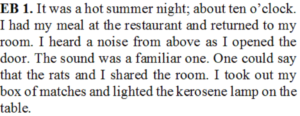

(i) What is the profession of ‘I’ who is referred in the above extract?
(ii) What was the arrangement for lighting the room?
(iii) Which word in the extract is synonym of ‘food’?
(iv) Who shared the room with ‘I’?
(v) Which word as used in the extract is antonym of ‘unknown’?
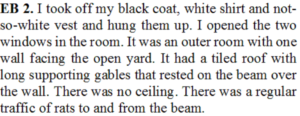

(i) According to the extract which cloth was not completely white?
(ii) According to the extract how many windows were in the room?
(iii) How many walls of the room faced the yard?
(iv) Which word as used in the extract mean ‘movement’?
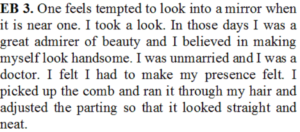

(i) Which word as used in the extract mean ‘inclined’?
(ii) According to extract the narrator believed in ?
(iii) What two reasons the narrator had stated to look better?
(iv) What did the author want to look neat and straight?
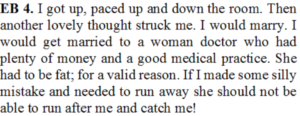

(i) What lovely thought came to the mind of narrator?
(ii) What educational qualification the narrator wanted his wife to have?
(iii) Which physical attribute the narrator wanted her wife to possess?
(iv) Which word in the extract is antonym of ‘wise’?
(v) Did author give importance to money? How do you understand about it?
(vi) Which word in the extract is antonym of ‘illogical’?
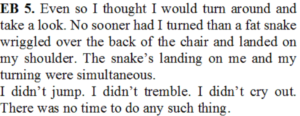

(i) Why narrator wanted to turn and have a look?
(ii) According to the extract from where did the snake appear?
(iii) Where did the snake sit after coming out of back of the chair?
(iv) Which word in the extract is antonym of ‘separate’?
(v) Why did narrator not jump, tremble or cry out?
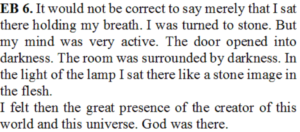

(i) According to extract which statement would be wrong?
(ii) Which line from the extract mean that narrator was not able to move?
(iii) Which line from the extract imply that narrator had not become dumb?
(iv) Who is referred as creator of the world?
(v) Which word in the extract is synonym of ‘bounded’?


(i) To whom does the word ‘it’ refer to?
(ii) What medicine the narrator is referring to?
(iii) Please write three adjectives narrator has used for himself.
(iv) Why did the narrator smile at himself?
(v) Which word of the extract is antonym of ‘strongly’?
(vi) What did the narrator want to forget?
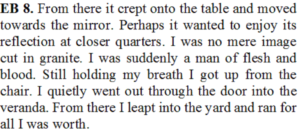

(i) To whom does the word ‘it’ refer to?
(ii) Why did it move towards mirror?
(iii) Which type of a stone has been mentioned in the extract?
(iv) Which word in the extract mean ‘jumped’?
(v) What was the profession of ‘I’?


(i) Who is the speaker of the above extract?
(ii) According to the extract atleast how many people had gone to the room?
(iii) What is the one thing the thief had not taken?
(iv) Which word in the extract is used as synonym of ‘shift’?
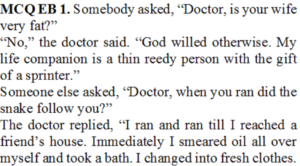

(i) Whom did the doctor thank for his wife being thin?
(a) his father
(b) her father
(c) God
(d) His mother
(ii) Other than being thin, what other quality of wife has been mentioned?
(a) weightlifter
(b) boxer
(c) swimmer
(d) sprinter
(iii) Where did the doctor go?
(a) to a hotel
(b) to her friend’s house
(c) to his friend’s house
(d) to his relative’s house
(iv) Which word in the extract is synonym of ‘mate’?
(a) wife
(b) doctor
(c) companion
(d) God
(v) Based on the extract please classify following as fact and opinion
1. Doctor’s wife was thin
2. People should not ask such questions
3. Doctor ran non-stop to his friend’s house
4. I wonder why the doctor did not run along with his wife
(a) F -1,2 and O -3,4
(b) F- 1,4 and O- 2,3
(c) F – 3,4 and O – 1,2
(d) F – 1,3 and O – 2,4
(vi) Which of the following the doctor did not do at his friend’s house?
(a) smeared oil on his body
(b) married his wife
(c) changed his clothes
(d) took bath
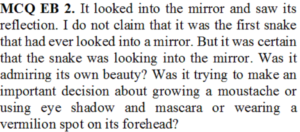

(i) What did author consider certainly true?
(a) snake was fat
(b) snake was beautiful
(c) snake was looking in the mirror
(d) snake was admiring its own beauty
(ii) The narrator has claimed that
(a) it was the only snake to look into a mirror
(b) it was the first snake to look into a mirror
(c) it was not the first snake to look into a mirror
(d) it was not the only snake to look into a mirror
(iii) An expression ‘that had ever’ has been used in the extract. Which of the following is not the correct use of similar expression?
(a) He was a person that had ever sold a new product
(b) He was a person that had ever reached moon
(c) He was a person that had ever recited a poem
(d) He was a person that had ever lived for 100 years
(iv) Based on the extract please classify following as fact and opinion
1. The snake saw its own reflection in the mirror
2. The snake was admiring its own beauty
3. The snake was trying to make an important decision
4. The snake was narrating anything
(a) F -2,3 and O- 1,4
(b) F – 1,2 and O – 3,4
(c) F – 1,3 and O – 2,4
(d) F – 1.4 and O -2,3
(v) Which word as used in the extract is synonym of ‘vital’?
(a) decision
(b) admiring
(c) important
(d) reflection
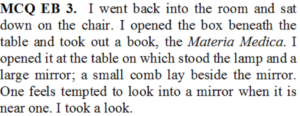

(i) What does the word ‘beneath’ refer to in above extract?
(a) below
(b) above
(c) ahead
(d) overhead
(ii) Other than the book, how many items were lying on the table?
(a) cannot be calculated
(b) one
(c) two
(d) three
(iii) The phrase ‘one feels tempted has been used in the extract. Which of the following is not the correct use of similar expression.
(a) One feels tempted to sleep more in the morning
(b) One feels tempted to dance if music is good
(c) One feels tempted to cry if weather is pleasant
(d) One feels tempted to eat more if food is tasty
(iv) ‘I opened it on the table.’ In this sentence what does ‘it’ refer to?
(a) mirror
(b) comb
(c) box
(d) book
Short Answer Questions (30-40 words)


Answer: One day the narrator returned to his room around 10 in the evening. He had gone to a restaurant for his meal. After some time he had an encounter with snake in his room.


Answer: By the time he returned to his home, it was dark. His room did not have arrangement for electricity. He lit the kerosene lamp to remove darkness of his room.


Answer: The doctor was a bachelor so he did not require a bigger accommodation. He was poor and did not have good medical practice. He could not afford to pay rent to a room that had better facilities.
So he was living in a small room which did not have basic facilities.


Answer: He lived in a small room that did not have facility. His shared the room with rats He accepts that his earnings were meagre. He had only sixty rupees with him. His had some shirts, dhoties, vests and a solitary coat clothes.
Thus we can conclude that the doctor was a poor person.


Answer: The doctor wanted to marry a lady doctor who would have lot of money and good medical practice. He also wished that she should be quite fat. If he ran after making some silly mistake, she should not be able to catch him.


Answer: The hood of the snake was barely four inches away from his face. He feared that it could strike him any moment.
The doctor did not jump, tremble or shout. He sat their without making any movement. He was holding his breath still.


Answer: The snake had climbed on the shoulder of the doctor. He feared that it might bite him. Suddenly he realised that he did not have medicine for snakebite.
At this juncture he smiled feebly at himself. It was a smile at his foolishness and helplessness.


Answer: The snake fell from roof with a thud. Then it climbed on the chair. It wriggled out of the back of the chair and landed on shoulder of the doctor and coiled itself around the left arm of the doctor. Sometime later it saw its reflection in the mirror and moved in front of the mirror.


Answer: The snake had coiled around the left arm of the doctor. Its hood was spread out and the head of the snake was about four inches away from the face of the doctor. The doctor feared that the snake could bit him anytime.
It was then the doctor made the above referred statement.


Answer: Probably the snake was appreciating its own beauty. Or it was trying to make an important decision to grow a moustache. Or it wanted to use eye shadow and mascara or wear a vermilion spot on its forehead.
The doctor made above guess about thoughts of the snake.


Answer: The snake was tightening its grip on the arm of the doctor. Suddenly it saw its own reflection in the mirror. Probably it got attracted to the reflection and moved closer to the mirror.
In this process the snake released the arm of the doctor.


Answer: Once the snake moved closer to mirror, it was not sitting in the lap of the doctor. Now the doctor felt that he was a man of blood and flesh. He quietly got up from the chair and moved to veranda. Then he leapt into the yard and ran towards house of his friend.


Answer: The doctor applied oil on his body, took bath and changed his clothes.
The doctor stayed with his friend overnight.


Answer: The doctor wanted to collect his belongings from his room.
So next day in the morning, he went to his room with his friend and one or two other people.
He observed that a thief had already taken away his belongings. The only thing left was his not-so-white vest.
Long Answer questions (120-150 words)


Answer: The room was quite small. It had tiled roof and no ceiling. The room had long gables that rested on the beams constructed on walls. It was outer room facing an open yard. It had windows that opened in the yard. The room had provision of a veranda.
Many rats lived in the room. The doctor has said that he shared the room with rats. The room did not have electricity. The doctor had kept a kerosene lamp in his room. He would use it during the night time for removing darkness. He had kept a table, a chair, a cot, a box and a mirror in his room.
A snake had entered into his room. He was afraid of it. So he did not want to stay there anymore. He wanted to leave the room.


Answer: The doctor was not a rich person. He had just started his medical practice and his earnings were meagre. He could not afford to rent a decent accommodation for himself. He was living in a small room that did not have facility of electricity. He had kept a kerosene lamp.
His belongings were limited. He had some shirts, dhoties and a solitary black coat. He had a table, a chair, a cot, a box and a mirror in his room.
He wanted to lead a life of rich person. He thought of marrying a lady doctor who would have plenty of money and good medical practice. He wished that his wife would be a fat lady. When he committed silly mistakes and wanted to run away, his wife should not be able to catch him.
Thus there is contrast between his present condition and his ambition.


Answer: The doctor liked to look into the mirror. He thought of himself as a handsome person. He used to comb his hair and correct his parting. He would travel into the world of imagination. He would imagine to grow a moustache, shave daily and to always keep a smile on his face. He wanted to do these activities to look smarter.
The snake had a firm grip on the arm of doctor. But when it saw its reflection in the mirror, it left the doctor. It wanted to see its reflection from close quarters. While snake was looking into the mirror it paid no attention to its surroundings. Probably the snake too was imagining the ways to look smarter.
Thus the doctor and the snake both had similar thought process while looking into the mirror.
****
A LEGEND OF THE NORTHLAND
(Extra Questions)
Extract Based Questions


(i) Which poetic device has been used in the first line of the extract?
(ii) What is meant by ‘hours of day are few’
(iii) Why people cannot sleep throughout the night?
(iv) The extract talks about which place?


(i) Which poetic device is used in last line of the extract?
(ii) Which word in the extract is antonym of ‘slow’
(iii) Which poetic device has been used in the third line of the extract?
(iv) Who pulls a sledge?


(i) What does the word ‘they’ mean in this extract?
(ii) Which poetic device is used in the first line of the extract?
(iii) Which word in the extract is synonym of ‘story’?
(iv) Does narrator feel that the story is true?
(v) Which word in the extract closely means ‘wisdom’?


(i) What does the word ‘world below’ mean in this extract?
(ii) Which word in the extract imply ‘respectable’ or ‘reverend’?
(iii) What Saint Peter used to do in the world below?


(i) To whom does the word ‘he’ refer to in the above extract?
(ii) Who was making cakes?
(iii) Which phrase in the extract mean ‘throughout the world?
(iv) Which part of a furnace is mentioned in the extract?
(v) Which poetic device has been used in the third line of the extract?


(i) What word as used in the extract mean ‘weak’?
(ii) What is meant by ‘day was almost done’?
(iii) How many cakes ‘he’ wanted to take?
(iv) Which poetic device has been used in the third line of the extract?


(i) Which word in this extract mean ‘small’?
(ii) Which poetic device is used in the third line of the extract?
(iii) Which word as used in the extract is synonym of ‘very’?
(iv) For whom ‘she’ was baking a cake?


(i) Which word in the extract mean ‘prepared dough’?
(ii) Which poetic device is used in the fourth line of the extract?
(iii) Which word in the extract is antonym of ‘larger’?
(iv) Do you think ‘she’ wanted to give a larger cake?


(i) To whom does the word ‘she’ refer to in this extract?
(ii) Which poetic device is used in the second line of the extract?
(iii) With what item ‘she’ could not part with?
(iv) Which phrase in the extract mean ‘give away’?
(v) Which poetic device has been used in the third line of the extract?
(vi) Which word in the extract mean ‘piece’?


(i) What does the word ‘too’ mean in this extract?
(ii) How does a cake appear to ‘she’ if it were for herself?
(iii) How does a cake appear to ‘she’ if it were to be given away?
(iv) In the fourth line to whom does the word ‘them’ refer to?
(v) What is the poetic device used in the first line of the extract?


(i) What does the word ‘faint’ mean in this extract?
(ii) Which poetic device is used in the third line of the extract?
(iii) Which word in the extract mean ‘to make angry’?
(iv) How did woman provoke Saint Peter?
(v) What was the physical condition of Saint Peter?


(i) What phrase in the extract men ‘much more?
(ii) To whom does the word ‘you’ refer to in the above extract?
(iii) What three things the woman had?
(iv) Who is speaker of the extract?
(v) Name writer of the poem from which the extract has been taken?


(i) Which word in the extract mean ‘very less quantity’?
(ii) Which poetic device is used in the third line of the extract?
(iii) Who is speaker of the extract?
(iv) What shall ‘you’ build?
(v) How will ‘you’ get her food?


(i) Who got changed into a bird?
(ii) Through which part of the house ‘she’ flew away?
(iii) Which poetic device is used in the first line of the extract?
(iv) Please name the bird to which ‘she’ was changed into?
(v) What did ‘she’ say while changing into the bird?


(i) What was the colour of her head?
(ii) Which poetic device is used in the fourth line of the extract?
(iii) Which word in the extract is synonym of ‘remaining’?
(iv) Colour of which part of her clothes was not changed?


(i) Which word in the extract mean ‘rural area’?
(ii) Which poetic device is used in the fourth line of the extract?
(iii) Why does the bird do ‘boring’?
(iv) Where does the bird live?
(v) What was the bird in its earlier form?
Short Answer Questions (30-40 words)


Answer: Days in the Northland are of very short duration.
The poet has used this phrase to describe this situation.
.


Answer: Saint Peter had once come to the shop of woman. He requested her to give him a cake. He had not eaten anything during the day. He was feeling hungry and week. So he made the request.


Answer: She started baking a cake. But she found it too big to give. So she made another cake. She thought this too was too big. She made a third cake as thin as a wafer. She did not want to give even this cake. Eventually she did not give any cake to Saint Peter.


Answer: Saint Peter has been roaming throughout the day. He had become hungry and weak. He requested to woman to give him a cake. Woman made three cakes but did not give any to Saint Peter. He got angry because of selfish attitude of the woman.


Answer: Saint Peter turned the woman into a bird.
He gave a curse that she would make nests like other birds do. She will get her scanty food by boring into dry hard wood. Thus she will need to work hard the whole day to get her food.
Long Answer questions (120-150 words)


Answer: The Saint Peter was hungry and tired. He had requested the woman to give him just one cake. The woman had many cakes with her. She was rich, atleast relatively. She could have easily given one cake to him. This would not have affected her wealth.
But she was selfish. She made a small cake which she thought was big enough to be given free. She could not part with the other two cakes which were still smaller than the first one. She had to suffer for her selfishness and greed.
I believe each of us should help the needy. We derive so much from society. We must give back to society and try to help needy. This is the moral lesson we can derive from the poem.
****


0 Comments